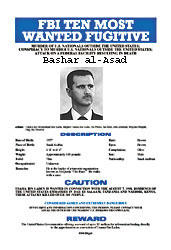Syria out of the blindspot

Lebanon is facing an "increasing influx of weaponry and personnel from Syria" to Palestinian militia groups, a United Nations report said yesterday. The report, the second of two United Nations investigations into Syria's interference in Lebanon, said there had been a remarkable turnabout from Syria's long domination there. Damascus removed its troops last spring after 30 years of occupation following mass demonstrations and international pressure over the assassination of former Prime Minister Rafik Hariri.
The situation remains "volatile," the report warned, citing "a number of worrying developments affecting the stability of Lebanon, particularly in the form of terrorist acts and the illegal transfer of arms and people across the borders into Lebanon."
While couched in diplomatic language, the report's clear implication that the Palestinian groups were acting at the behest of Syria appeared certain to increase pressure building against Damascus in the Security Council. The Council's special investigator issued a report last week saying the slaying of Mr. Hariri had been plotted by top-ranking Syrian and Lebanese intelligence officers, including the powerful brother-in-law of President Bashar al-Assad. Mr. Assad has denied that he or his aides had anything to do with the assassination. He sent a letter to France, Britain and the United States early this week promising to prosecute any Syrian implicated by "concrete evidence."
As the report was being released, Lebanese Army commandos backed by tanks were surrounding several Palestinian bases in the Bekaa region -including one manned by a main Syrian-backed group, the Popular Front for the Liberation of Palestine-General Command - and setting up roadblocks near the Syrian border. A Lebanese officer, speaking on condition of anonymity because he was not authorized to comment, said the military deployment was a tightening of security because of growing fears that the Palestinian militias were smuggling arms from Syria into the Bekaa.
The report issued yesterday, by the United Nations special envoy Terje Roed-Larsen, noted that the Lebanese Army had detained and deported a number of infiltrators of Palestinian origin who carried Syrian identification documents. It said "Lebanon is witnessing a momentous transformation" since September, 2004 when the Security Council adopted Resolution 1559 calling for the Syrian withdrawal and the disarmament of armed groups. But it also noted a series of assassinations and 14 bombings in the last year, for which Lebanese have widely blamed agents of Syria. "As a result of such acts, numerous Lebanese political leaders have chosen to spend prolonged periods of time abroad, for fear of their lives," it said. The report paid particular attention to the mounting tensions between the Lebanese government and the Damascus-backed Palestinian militias.